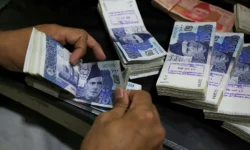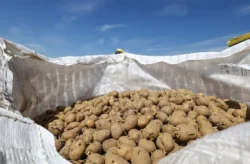Exports of agro and food products from Pakistan have increased by 64 percent during the first six months of the financial year of 2023-2024

Taimoor Mustafa
In the month of December only, there is growth of 118%, as food products of $882 million were exported in comparison with export of $404 million in same month in FY2022-23.
In the current fiscal year 2034-24, major increases were in export of sesame seed (278%), maize/corn (208%), ethyl alcohol (497%), meat (23%), rice (96%), fruits and vegetables (15%), spices (10%) and tobacco (34%). Pakistan exported sesame seed worth $364 million during July-December 2023-24 as compared to $98 million during July-December 2022-23, showing a positive growth of 278 %.
The reasons for increase of sesame seed is the increased production in 2023 (2022 crop was destroyed by flood) and higher demand/rate from China, Korea, Japan etc. Similarly, the exports of maize were $262 million during July-December, 2023-24 as compared to $85 million in July-December, 2022-23, showing a positive growth of 208%.
Pakistan’s maize exports have increased manifolds in value, as global prices of food commodities have increased due to the outbreak of Russian- Ukraine war.
The major markets for are Vietnam, Malaysia, Korea and Oman. Pakistan exported ethyl alcohol worth $259 million during July-December 2023-24 as compared to $43million during July-December, 2022-23, showing a positive growth of 4%. The reason for increase is the high global demand. In meat sector, Pakistan exported meat worth $ 239 million during July-December, 2023-24 as compared to $195 in July-December, 2022-23, showing a positive growth of 23%.
The reasons for positive growth of meat sector is due to opening of new markets (Jordan, Egypt, Uzbekistan), and participation of many new companies for exporting meat to UAE, KSA & GGC Region. Additionally 3 more slaughter houses were approved for exporting/processing by Malaysia.
Moreover, two meat exporting companies also got market access for exports of heat treated meat to China who have recently shipped heat treated meat to China.
The exports of rice were $1645 million during July-December 2023-24 as compared to $841 million in July-December 2022-23, showing a positive growth of 96%. The reason for increase is due to India’s rice export ban & increased production of rice in Pakistan.
Pakistan exported fruits and vegetables worth $285 million during July-December, 2023-24 as compared to $248 million in July-December, 2022-23, showing a positive growth of 15%.
Similarly, exports of spices showed growth of 10%.
Zubair Motiwalla, Chief Executive TDAP, said, “In 6 months period of current fiscal year, agro export has achieved 3.84 billion export, which is 64% higher, and we expect that $6 billion target in the current year will be achieved.” He further informed that keeping in view the recent surge in agro products exports, TDAP is actively supporting exporters, and providing all necessary assistance in product and market diversification.
The latest data released by the Pakistan Bureau of Statistics (PBS) indicates exports proceed at $2.82 billion, reflecting a 22.21% increase compared to the corresponding month last year. On a month-on-month basis, exports increased by 9.29%.
In the first half of FY24, exports registered a 5.17% growth, reaching $14.98 billion.
Pakistan exported sesame seed worth $364 million during July-December 2023-24 as compared to $98 million during July-December, 2022-23 showing a positive growth of 278 percent. The reasons for increase of sesame seed is the increased production in 2023
Similarly the exports of Maize were $262 million during July-December, 2023-24 as compared to $85 million in July-December, 2022-23 showing a positive growth of 208 percent. Pakistan’s maize exports have increased manifolds in value, as global prices of food commodities have increased due to the outbreak of Russian- Ukraine war. The major markets for are Vietnam, Malaysia, Korea and Oman.
Pakistan exported ethyl alcohol worth $259 million during July-December, 2023-24 as compared to $43 million during July-December, 2022-23 showing a positive growth of 4 percent. The reason for increase is the high global demand
The exports of rice from were $1645 million during July-December 2023-24 as compared to $841 million in July-December. 2022-23 showing a positive growth of 96 percent. The reason for increase is due to India’s rice export ban and increased production of rice in Pakistan. Pakistan exported fruits and vegetables worth $285 million during July-December, 2023-24 as compared to $248 million in July-December, 2022-23 showing a positive growth of 15 percent.
The exports of various food commodities were recorded at 2,640.905 million U.S. dollars during July-November of the ongoing fiscal year against the exports of 1,925.969 million dollars in July-November of the previous fiscal year, the PBS said.
The food commodities that contributed to positive growth in trade included rice, fruits, oil seeds, nuts, kernels, meat and meat preparations and sugar
DESPITE being critically stressed, Pakistan’s agriculture sector will contribute $3 billion to our economy in 2023-24. Still, it has the potential to grow much more.
If the new government takes a holistic approach, this potential can be realised by providing certified seeds, ensuring irrigation water supplies when needed most as w;ell as ensuring the availability of inputs and agricultural credit.
To address the challenges faced by Pakistan’s agriculture sector, the government established Special Investment Facilitation Council (SIFC) earlier this year to attract billions of dollars investments to Pakistan’s agriculture sector from the Gulf Cooperation Council (GCC) states and local investors to boost agriculture production, which can lead to job creation, increased exports, and the generation of additional tax revenues.
Following the establishment of SIFC, Pakistan’s agricultural sector has experienced notable achievements.
Furthermore, the Land Information and Management System, Center of Excellence (LIMS-CoE) was also established under the Director General Strategic Projects of Pakistan Army to enhance modern agro-farming by utilizing over 9 million hectares of uncultivated state land.
Overall, the formation of SIFC has been a major stake in Pakistan’s agriculture growth, bringing in investments, promoting modern practices, and driving sustainable development in the sector.
Through its initiatives and projects, SIFC has contributed to enhance productivity, increasing crop yields, and improve the overall efficiency of agricultural operations.
Caretaker premier hails work of ministries and departments for achieving milestones under umbrella of Special Investment Facilitation Council
The interim prime minister, addressing the National Farmers’ Convention as the chief guest, appreciated the collaborative work of ministries and departments for achieving various milestones under the umbrella of the Special Investment Facilitation Council (SIFC) and stressed the need to expedite various initiatives.
the climate change and water scarcity were realities that challenged Pakistan’s food security and necessitated use of technology and close government-public collaboration as being done under the SIFC.
the dividends of all initiatives by the SIFC would help Pakistan come out of the economic crisis. “United, we as a resilient nation will lead Pakistan towards a progressive and prosperous future, InshaAllah
The agricultural sector plays a crucial role in the economic landscape of Pakistan, serving as a significant source of employment for more than half of the nation’s populace.
Based on the findings of the Pakistan Economic Survey (2022-23), it has been determined that the aggregate cultivated land area amounts to 22.50 million hectares, thereby constituting a significant 22.9 percent share of the nation’s gross domestic product. In addition, it should be noted that this particular sector accounts for 37.4 percent of the total employed population.
Agriculture accounts for roughly 25% of GDP, and Pakistan is among the world’s top producers of wheat, cotton, sugarcane, mangoes, dates, rice, and oranges.
According to the Pakistan Bureau of Statistics, the value of agricultural exports in 2023-24 was $5.2 billion, an increase of 13% from the previous year. The major agricultural exports include rice, fruits, vegetables, cotton yarn, raw cotton, fish, and fish preparations.





